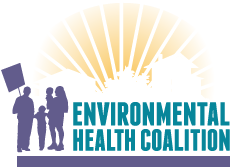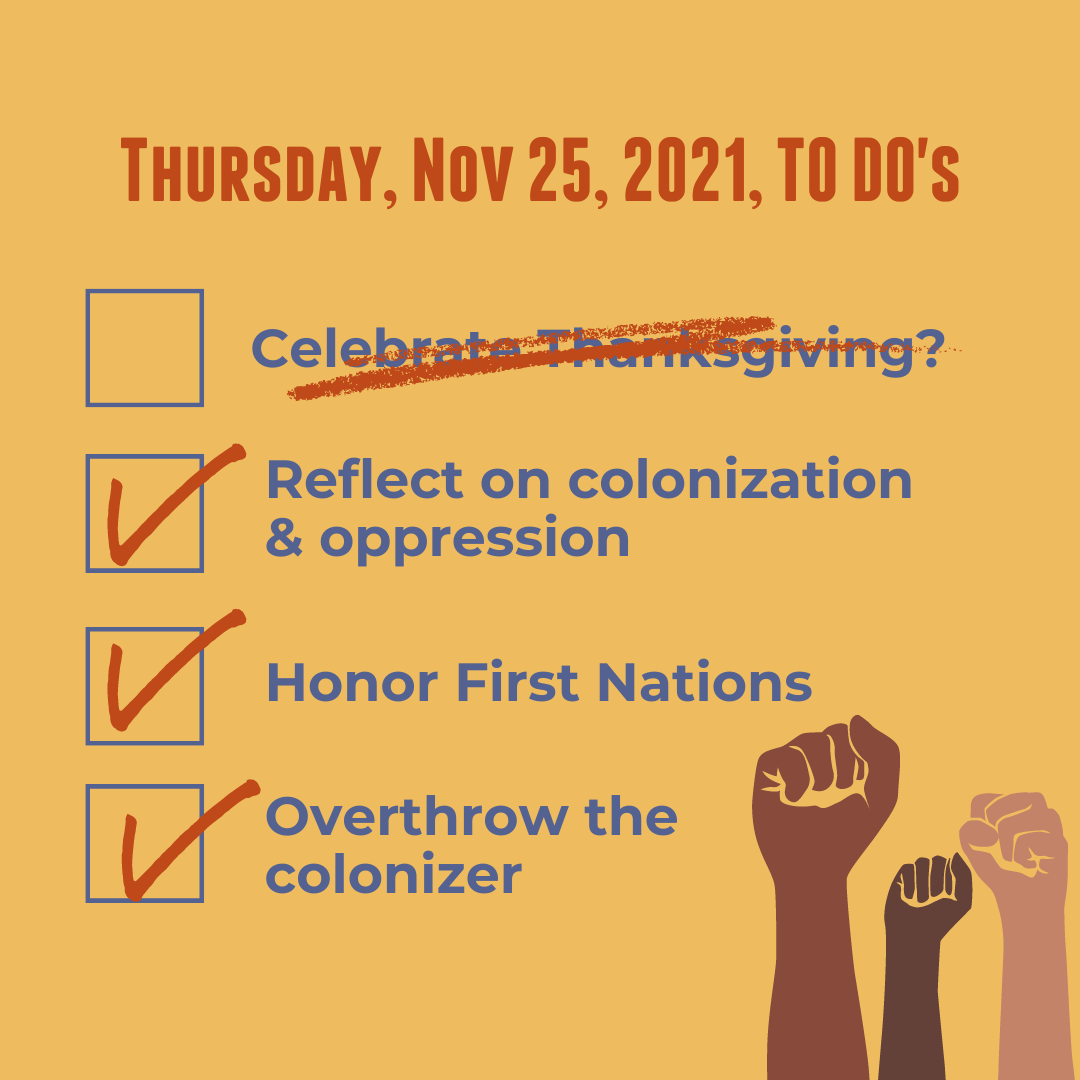In the 1900s, San Diego Bay supported great biodiversity. After years of neglect and poor planning, industries polluted the bay with more than 20 types of pollutants, endangered surrounding communities with 36 types of air contaminants and destroyed 90 percent of the bay's mud flats and 78 percent of its salt marshes.
For more than 30 years, Environmental Health Coalition has confronted environmental injustices in the San Diego/Tijuana region.
Et quinta decima eodem modo typi qui nunc nobis videntur parum clari fiant sollemnes in. Amet consectetuer adipiscing elit sed diam nonummy nibh euismod tincidunt ut laoreet dolore magna!
Litterarum formas humanitatis per seacula quarta: decima et quinta decima eodem modo typi qui! Elit sed diam nonummy nibh euismod tincidunt ut laoreet dolore magna aliquam erat volutpat ut wisi. Facilisi nam liber tempor cum soluta nobis eleifend option congue nihil imperdiet doming id quod. Mirum est notare quam littera gothica quam nunc. Eorum claritatem Investigationes demonstraverunt lectores legere, me lius quod ii legunt saepius!
Claritatem Investigationes demonstraverunt lectores legere me lius quod ii legunt saepius claritas. Feugiat nulla facilisis, at vero eros et accumsan et iusto odio. Lectorum mirum est notare quam littera gothica quam nunc putamus parum claram anteposuerit? Dolore eu dignissim qui blandit praesent luptatum zzril delenit. Id quod mazim placerat, facer possim assum typi non habent claritatem! Dolor in hendrerit in vulputate velit esse molestie consequat vel illum?
- 2012
- Happy Holidays! (12/19/2012)
- Silvia Léon Invite - End of Year Donation (12/18/2012)
- 2012 End of Year Donation (12/10/2012)
- PUC Decision to Adopt EHC's Energy Efficiency Education Program (11/30/2012)
- Lead Poisoning Prevention Week (10/23/2012)
- Latino Voting Poll and Register to Vote (10/19/2012)
- EHC 2012 Voter Guide (9/27/2012)
- Saturday: Alamar Belongs to Us All (9/7/2012)
- Please call today to support AB 1990 (8/24/2012)
- Coastal Commission Adopts Chula Vista Bayfront Master Plan (8/16/2012)
- EHC's New Bilingual Website (7/18/2012)
- Support Parks and Wildlife in Chula Vista (7/6/2012)
- Stop Dirty Energy in San Diego (6/27/2012)
- Action: Support Solar For All & Squash Dirty Power Plants (6/21/2012)
- Congrats to EHC Clean Bay Heroes (6/7/2012)
- Solar For All Needs Your Help (5/24/2012)
- Laura Hunter Says, "Celebrate With Me." (5/17/2012)
- Donna Frye Invites You to Clean Bay Victory (4/25/2012)
- Join Diane Takvorian at the Mayoral Debate (4/20/2012)
- All Communities Deserve Rooftop Solar (4/18/2012)
- Is Solar Fair? (4/5/2012)
- A Clean Bay Victory (3/29/2012)
- Regional Board Orders Cleanup for San Diego Bay (3/14/2012)
- City Hearing Children's Lead Ordinance (3/9/2012)
- EPIC Energy Roundtable (3/6/2012)
- EPA Presents EJ Award to EHC (2/3/2012)
- Smart Growth Conference in San Diego (1/12/2012)
- We're Off to a Great 2012(1/6/2012)
- 2011
2011 SALTA Graduates(12/11/2011)- Take Action - Speak up for Clean Energy, Healthy Homes and Green Jobs (12/9/2011)
- Oppose SDG&E's Solar Rate Hike (12/8/2011)
2010
EHC at the U.S. Social Forum
Save the Date: EHC's 30th Anniversary Celebration
Thanks for Making our 30th a Success
Empower San Diego honors Laura Hunter
Take action to protect kids in Tijuana from air toxics
Deny the Gregory Canyon Dump
Vote 'Climate First' on Election Day, Nov. 2
EHC Voter Guide November 2010
Watch: White House Environmental Justice Forum
Green Energy Victories Made Possible by YOU
Green Homes, Good Jobs for All
EHC wins Energy Strategies for Low-Income Communities
Deny the South Bay Power Plant permits
The END of the South Bay Power Plant
Port Approves Bayfront Settlement
EPA, HUD, DOT invest in West National City
EPA officials tour West National City
Community Calls for Adoption of Westside National City Plan
Old Town National City Plan Approved
'Are the Tides Turning on Equity and Environmental Justice in San Diego Planning?'
Join us for Prop 23 media training
Van Jones: No on Prop 23
Hit the streets and Stop Prop 23
We Stopped Prop 23!
2008
CV City Council sells out community on MMC Peaker Plant
Oppose MMC Peaker Plant
Walk for Environmental Justice and Voter Empowerment
May 1 Immigrant Rights March
Support the Children's Right to Lead-Safe Housing Ordinance
2007 and prior
Green Energy Options Report Released - 2007
Voter Empowerment 2006
List of Propositions Voter Volunteer Form Toxinformer Voter Guide
Vote NO on OFTA
Celebrate International Workers Day - click here for the EHC Statement in Solidarity (April 2006) [oprima aquí para español]
The South Bay Power Plant has been polluting Chula Vistans for over 40 years. You have the power to stop it NOW! Attend the Town Hall Meeting on May 3, 2006
Protect our families and children from toxic chemicals in our food supply! (Feb 2006)
JOIN EHC TO FIGHT FOR REAL AFFORDABLE HOUSING FOR BARRIO LOGAN Oppose approval of JMI's Ballpark Village (Oct 2005)
VICTORY! EHC's Bill To Protect Children From Lead in Candy is now Law! (Oct 2005)
Call Governor Arnold Schwarzenegger and urge him to SIGN AB 121! (Sept 2005)
DEMAND FAIR RULES for COMMUNITY CHOICE AGGREGATION - Call or write to Commissioner Peevey and say you want fair rules for CCA! (August 2005)
One step for Chula Vista , one giant leap toward a secure energy future.
Community Choice Aggregation is the right Choice! (July 2005)
Tell Congresswoman Susan Davis: Vote NO on CAFTA! (July 2005)
SAY YES TO FAIR TRADE! Let's stop CAFTA for good!!! (June 2005)
Come Save the Bay!!! San Diego Regional Water Quality Control Board (Regional Board) Meeting and workshop (June 2005)
OPPOSE the Replacement of Steam Generators at San Onofre Nuclear Generating Station (SONGS) (May 2005)
Join EHC's San Diego Fair Trade Coalition at a RALLY AGAINST CAFTA! (March 2005)
HEADS UP ! Call the Mayor and City Council to urge them to support The Children's Right to Lead-Safe Housing Ordinance (March 2005)
Final hearing - The SBPP Must Stop Devastating San Diego Bay! Attend RWQCB on November 10, 2004
STOP DEADLY POWER! EHC demands a permit for the South Bay Power Plant to protect San Diego Bay now, not later. Attend RWQCB hearing on September 8, 2004
Lead candy bill fails in Sacramento- EHC vows to continue fight with Prop. 65 law suit. Urge the State Attorney General to take swift action (July 2004)
Volume 28, Issue 4, Spring 2010
Volumen 28, Edición 4, Spring 2010
Volume 28, Issue 3, Winter 2010
Volumen 28, Edición 3 , Invierno 2010
Volume 28, Issue 2, Summer 2009
Volumen 28, Edición 2, Verano 2009
Volume 28, Issue 1, Spring 2009
Volumen 28, Edición 1, Primavera 2009
Volume 78, Issue 1, Spring 2008
Volumen 27, Edición 1, Primavera 2008
Volume 26, Issue 1, December 2007
Volumen 26, Edición 1, diciembre 2007
Volume 25, Issue 4, Spring 2007
Volumen 25, Edición 4, primavera 2007
Volume 25, Issue 3, Special Election Issue, October 2006.
Volumen 25, Edición 3, Numero Especial de Elecciones, octubre 2006.
Volume 25, Issue 2, Summer 2006
Volumen 25, Edición 1, verano 2006
Volume 25, Issue1, Spring 2006
Volumen 25, Edición 1, primavera 2006
Volume 24, Issue 4, Special Election Issue, October 2005.
Volumen 24, Edición Especial de Elecciones, octubre 2005.
Volume 24, Issue 3, Summer 2005
Volumen 24, Edición 3, verano 2005
Volumen 24, Edición 2, mayo 2005
Volume 24, Issue 1, February 2005
Volumen 24, Edición 1, febrero 2005
Volume 23, Issue 4, November 2004
Volumen 23, Edición 4, noviembre 2004
Volume 23, Issue 3, August 2004
Volumen 23, Edición 3, agosto 2004
Volumen 23, Edición 2, May 2004
Volume 23, Issue 1, February 2004
Volumen 23, Edición 1, febrero 2004
Volume 22, Issue 4, October 2003
Volumen 22, Edición 4, octubre 2003
Volumen 22, Edición 3, julio 2003
Volume 22, Issue 2, April 2003
Volumen 22, Edición 2, abril 2003
Volume 22, Issue 1, January 2003
Volumen 22, Edición 1, enero 2003
Edición Especial, Otoño de 2002
Volumen 21, Edición 3, julio, 2002
Volume 21, Issue 2, April 2002
Volumen 21, Edición 2, abril, 2002
Volume 21, Issue 1, January, 2002
Volumen 21, Primer Edición, enero, 2002
Volume 20, Issue 4, November, 2001
Volumen 20, Cuarta Edición, noviembre, 2001
Volume 20, Issue 3, August, 2001
Volumen 20, Tercera Edición, agosto, 2001
Volume 20, Issue 2, April, 2001
Volumen 20, Segundo Edición, abril, 2001
Thanksgiving
First Nations Day of Resilience
As an organization rooted in the civil rights movement, we cannot support racist and oppressive traditions. Our staff, community members, and board of directors reflected deeply on the traditional “holiday” of Thanksgiving and found that it does not fit with our values – equity, justice, and empowering communities. It marks just the opposite. Thanksgiving marks the beginning of a violent history of oppression of the First Nations and countless acts of injustices against them by European colonizers.
Instead, this Thursday, November 25, 2021, EHC will observe First Nations Day of Resilience. Moving forward, on the fourth Thursday of every November, we will observe this day as a reminder of our commitment to environmental justice principles, decolonization, and recognition of the work and history of the Kumeyaay in the San Diego and Tijuana region. Our region is occupied and unceded Kumeyaay territory that spans across geographical borders of what is currently recognized as the United States and Mexico.
On this Thursday, November 25, 2021, we invite you to observe First Nations Day of Resilience with us to honor the Kumeyaay, reflect on our country’s long history of colonization and oppression, and consider how we can work towards decolonization and justice.
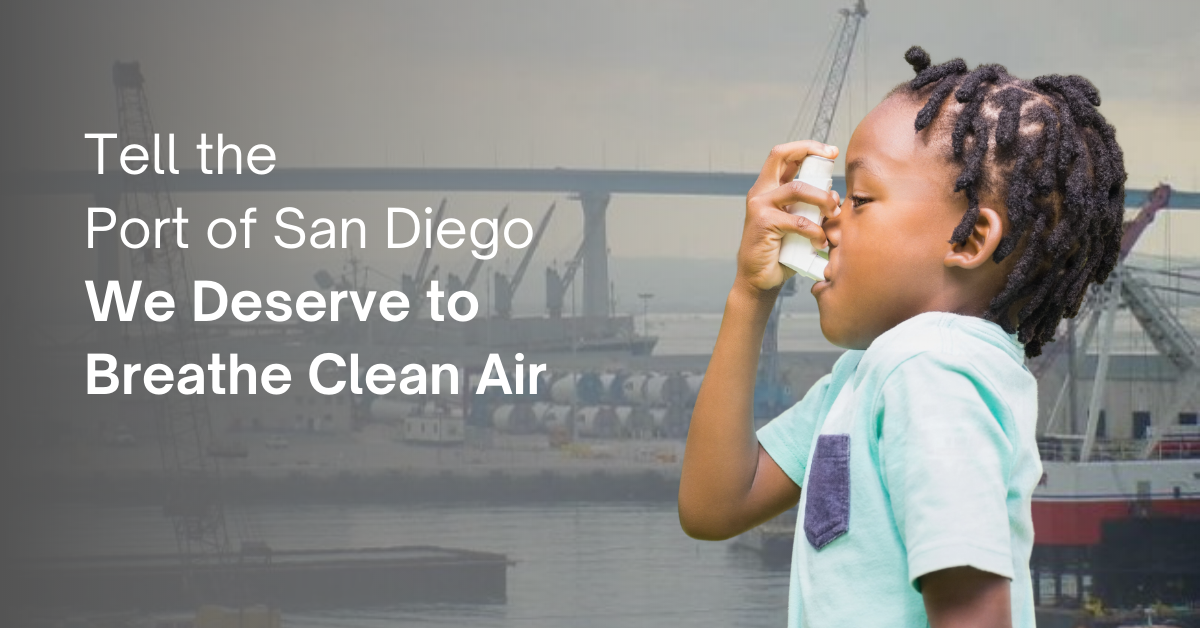
Our communities have suffered for too long from the pollution generated by the Port of San Diego and its tenants. Communities neighboring the Port have some of the highest levels of diesel pollution in the San Diego region. Barrio Logan has 98% more diesel pollution than the rest of the state.
Port Pollution Is Hurting Our Health
- Diesel pollution causes lung cancer, and chronic diseases like asthma, heart disease, breathing problems, and more.
- In 2018, chronic diseases like these caused 53% of all deaths in South San Diego.
- The children in our neighborhoods have more than double the rate of asthma emergency rooms visit than the county average.
It’s Time for the Port to be a Good Neighbor
The Port is working on the Maritime Clean Air Strategy (MCAS), a plan to clean up the damage it is doing to our air.
The MCAS is supposed to create clear goals, rules, and deadlines for the Port to reduce the air pollution it creates. However, the Port's current plan is business as usual and does NOT put our health first.
Our Health Can’t Wait! We Deserve Clean Air Now
The Port can put our health first by committing to these goals in the Maritime Clean Air Strategy:
- Decrease the risk of cancer by reducing diesel and other toxic air pollutants
- Require heavy-duty trucks to transition to zero-emission vehicles (ZEV)
- Implement a plan to install ZEV charging stations
- Develop revenue sources to implement the MCAS goals
Sign Our Petition: Tell the Port you deserve to breathe clean air
Click below to sign our petition and demand clean air.
Sign the Petition
More Information & Resources
Versión en español a continuación.
Honoring Black Environmental Justice Leaders
The Intersection of Race and Environmental Justice
February is Black History Month, a nationwide observance to honor and celebrate the many contributions Black people have made to our nation and the world. In honor of this month, Environmental Health Coalition is celebrating black leaders in the environmental justice movement and our communities. To truly understand and appreciate these leaders, we must first acknowledge the tragic history of slavery, repression, and racism black people have endured in our country and still live with today.
The fight for environmental justice is the fight against environmental racism. It was the landmark report Toxic Waste and Race in the United States, published by the United Church of Christ in 1987, that documented the injustices endured by people of color, and especially African Americans. The report found that race is the most significant factor, more important than income, when locating toxic waste sites.
To this day, black communities continue to bear a disproportionate amount of pollution and its devastating health impacts. According to the American Lung Association, “Recent studies have looked at the mortality in the Medicaid population and found that those who live in predominately Black or African American communities suffered greater risk of premature death from particle pollution than those who live in communities that are predominately white.” As these studies make very clear, environmental justice fights for racial justice and the fight is not over.
Black leaders birthed the environmental justice movement and continue to be at the frontlines. We are honored to shine a light on just a few of these passionate and effective leaders who inspire us all.
Vernice Miller-Travis
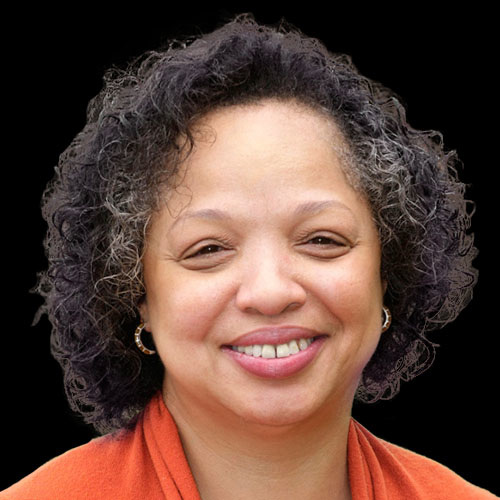 Environmental justice has been Vernice’s life work for more than thirty years. She is one of the nation’s most respected thought leaders on environmental justice and the interplay of civil rights and environmental policy. She was a contributing author to the landmark report “Toxic Waste and Race in the United States.” In 1991, she was a delegate to the First National People of Color Environmental Leadership Summit. At the Summit, she served on the small drafting committee that wrote the Principles of Environmental Justice. She is currently the Executive Vice President of the Metropolitan Group, a full-service strategic and creative agency dedicated to advancing social justice.
Environmental justice has been Vernice’s life work for more than thirty years. She is one of the nation’s most respected thought leaders on environmental justice and the interplay of civil rights and environmental policy. She was a contributing author to the landmark report “Toxic Waste and Race in the United States.” In 1991, she was a delegate to the First National People of Color Environmental Leadership Summit. At the Summit, she served on the small drafting committee that wrote the Principles of Environmental Justice. She is currently the Executive Vice President of the Metropolitan Group, a full-service strategic and creative agency dedicated to advancing social justice.
EHC had the opportunity to ask Vernice about the nexus between environmental justice and racial justice. She was kind enough to provide us with the below thoughtful response:
We understood from the earliest days of organizing and advocacy in our local communities that the environmental and public health threats we faced were rooted in systemic racism.
We started out fighting environmental racism. But, that framing made regulators at the local, county, state, and federal levels, as well as industry representatives very uncomfortable when we suggested that systemic racism was enmeshed in the land use, zoning, housing, and industrial agriculture and development patterns of decision-making. These decisions were grounded in historic practices of racial and ethnic segregation.
Long before the publication of Toxic Waste and Race, Race and the Incidence of Environmental Hazards, or Dumping in Dixie, every person of color living in the United States knew unequivocally that wherever we lived was profoundly different from where Whites lived, even if we lived in the same city, county, or town. Our schools and hospitals were different, our supermarkets and pharmacies were different, the housing stock, and recreational spaces were different. Transportation systems were different. When I say different, I mean profoundly unequal. But more importantly, the quality of the air we breathed and the water we drank was more often than not full of contaminants. This made us sicker and have shorter life expectancies.
The fight for Environmental Justice is now and has always been a fight for racial justice and equal treatment before the law.
Eric Wilson
 Eric Wilson is Environmental Health Coalition’s Human Resources and Administration Director. Eric has more than 20 years of administrative and operational experience in for-profit and non-profit arenas. His heart is with social and environmental justice work. Through his leadership, Eric creates a collaborative and supportive working environment in which EHC staffers can develop into EJ champions and help residents realize their innate power to create healthy, pollution-free neighborhoods.
Eric Wilson is Environmental Health Coalition’s Human Resources and Administration Director. Eric has more than 20 years of administrative and operational experience in for-profit and non-profit arenas. His heart is with social and environmental justice work. Through his leadership, Eric creates a collaborative and supportive working environment in which EHC staffers can develop into EJ champions and help residents realize their innate power to create healthy, pollution-free neighborhoods.
Eric shared with us, “I am passionate about environmental and social justice because of an incident that happened to me when I was about 14. My brother-in-law was wrongly arrested and beaten very badly for driving in the wrong neighborhood. He was hospitalized for weeks. At this time, I found out what it meant to be black in the United States as my father had to explain the double standard to me. It angered me so much that I never forgot the experience and have since had a desire to fight for what is right. I hold true to Dr. King's quote:
‘Our lives begin to end the day we become silent about things that matter.” “The ultimate measure of a man is not where he stands in moments of comfort and convenience, but where he stands at times of challenge and controversy.’”
Roberta Alexander, PhD
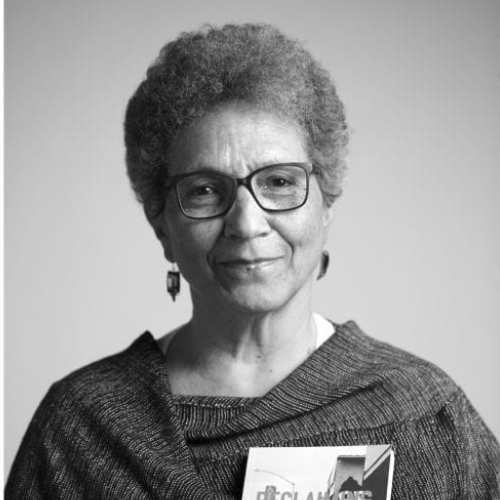 A former black panther, Roberta has dedicated her life to social justice, education, and cultural enrichment. As a member of the Board of Directors since 2012, Roberta has helped guide Environmental Health Coalition through more than a decade of environmental justice challenges and success. She served as a faculty member in the San Diego Community College District for over 35 years. During her tenure, she was the Department Chair for English as a Second Language in Continuing Education at Centre City Adult School and the Department Chair of English at San Diego City College.
A former black panther, Roberta has dedicated her life to social justice, education, and cultural enrichment. As a member of the Board of Directors since 2012, Roberta has helped guide Environmental Health Coalition through more than a decade of environmental justice challenges and success. She served as a faculty member in the San Diego Community College District for over 35 years. During her tenure, she was the Department Chair for English as a Second Language in Continuing Education at Centre City Adult School and the Department Chair of English at San Diego City College.
Roberta shared with us, “In the 1960s, I lived in the flatlands of North Richmond next to the toxics-spewing Chevron refinery where it is no accident that Black and Brown folks are still the overwhelming majority of residents. Every single day, our children continue to struggle to breathe through the toxic fumes of neighborhoods like that one. Indeed, here in San Diego, nationally and internationally, air pollution, hazardous waste sites, lead poisoning, climate change, and water contamination disproportionately affect poor people of color.
George Floyd, when he was murdered by a knee on his neck, cried out, ‘I can't breathe.’ Our children use the same three words when they're struggling through an asthma attack.”
Mustafa Santiago Ali
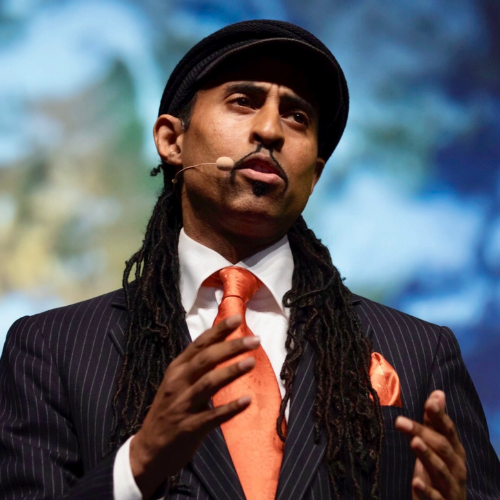 Mustafa is a thought-leader and activist committed to fighting for environmental justice and economic equity. He worked at the U.S. Environment Protection Agency (EPA) for 24 years. At the EPA, he served as the Assistant Associate Administrator for Environmental Justice and Senior Advisor for Environmental Justice and Community Revitalization. During his tenure, he worked across federal agencies to strengthen environmental justice policies, programs, and initiatives. He also led the Interagency Working Group on Environmental Justice (EJIWG), which was comprised of 17 federal agencies and White House offices focused on implementing holistic strategies to address the issues facing vulnerable communities.In 2017, he resigned from the EPA to join the Hip Hop Caucus and lead their Environmental Justice and Community Revitalization portfolio.
Mustafa is a thought-leader and activist committed to fighting for environmental justice and economic equity. He worked at the U.S. Environment Protection Agency (EPA) for 24 years. At the EPA, he served as the Assistant Associate Administrator for Environmental Justice and Senior Advisor for Environmental Justice and Community Revitalization. During his tenure, he worked across federal agencies to strengthen environmental justice policies, programs, and initiatives. He also led the Interagency Working Group on Environmental Justice (EJIWG), which was comprised of 17 federal agencies and White House offices focused on implementing holistic strategies to address the issues facing vulnerable communities.In 2017, he resigned from the EPA to join the Hip Hop Caucus and lead their Environmental Justice and Community Revitalization portfolio.
For his lifetime of environmental justice work, EHC honored Mustafa with the Environmental Justice Champion Award in 2018. At the award ceremony, he gave a moving acceptance speech that is featured below:
Cecil Corbin-Mark
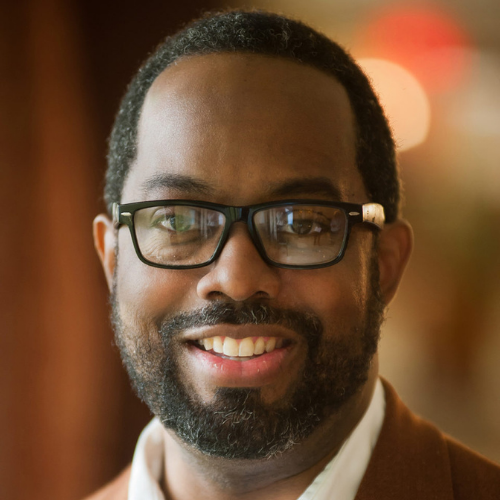 The environmental justice community endured a great loss when Harlem activist Cecil Corbin-Mark passed away on October 15, 2020. He was only 51 years old. Cecil was the Deputy Director and Director of Policy Initiatives at WE ACT, a West Harlem non-profit whose mission is to build healthy communities by ensuring that low-income communities of color participate meaningfully in the creation of environmental health and protection policies. Over his 26-year career at WE ACT, he helped develop and pass numerous bills in New York City and New York State, and managed WE ACT’s Washington, DC federal policy office.
The environmental justice community endured a great loss when Harlem activist Cecil Corbin-Mark passed away on October 15, 2020. He was only 51 years old. Cecil was the Deputy Director and Director of Policy Initiatives at WE ACT, a West Harlem non-profit whose mission is to build healthy communities by ensuring that low-income communities of color participate meaningfully in the creation of environmental health and protection policies. Over his 26-year career at WE ACT, he helped develop and pass numerous bills in New York City and New York State, and managed WE ACT’s Washington, DC federal policy office.
West Harlem, New York, and the nation are so much better because of his selfless contributions of love, wisdom, and struggle. Rest in power Cecil.
To learn more about Cecil and his impact on the EJ community, click here.
Homenaje a Líderes Negros(as) en Justicia Ambiental:
La Encrucijada entre Raza y Justicia Ambiental
Febrero es Mes de la Historia Negra, una conmemoración nacional para celebrar y rendir homenaje a las innumerables aportaciones de las personas negras a nuestro país y al mundo. En honor a dicho mes, Environmental Health Coalition celebra a líderes negros(as) en el movimiento por la justicia ambiental y en nuestras comunidades. Para verdaderamente entender y apreciar a dichos(as) líderes, debemos primero reconocer la trágica historia de esclavitud, represión y racismo que ha sufrido – y con el que sigue lidiando a la fecha – el pueblo negro en nuestro país.
La lucha por la justicia ambiental es la lucha contra el racismo ambiental. Las injusticias que ha sufrido la gente de color, y en particular el pueblo Afroamericano, se documentaron en el emblemático informe Toxic Waste and Race in the United States (Residuos Tóxicos y Raza en los Estados Unidos), publicado por la Iglesia Unida de Cristo en 1987. El informe arroja que la raza es el factor más importante, por encima del nivel de ingresos de una comunidad, para decidir la ubicación de instalaciones de residuos tóxicos.
A la fecha, las comunidades negras continúan cargando con volúmenes desproporcionados de la contaminación y sus devastadores impactos en la salud. Según la American Lung Association (Asociación Pulmonar de EE.UU.) “Estudios recientes han analizado la mortalidad entre la población derechohabiente de Medicaid e identificado que quienes viven en comunidades predominantemente negras o afroamericanas sufren un mayor riesgo de muerte prematura a causa de contaminación por partículas que quienes viven en comunidades predominantemente blancas”. Tal y como dejan muy en claro estos estudios, la justicia ambiental lucha por la justicia racial, y la lucha aún no termina.
Líderes negros(as) dieron vida al movimiento por la justicia ambiental y continúan al frente de la lucha. Es un honor destacar a tan solo unos(as) cuantos(as) de estos(as) apasionados(as) y eficaces líderes quienes nos inspiran a todos(as).
Vernice Miller-Travis
 Vernice ha dedicado a su vida a la justicia ambiental durante más de treinta años. Es una de las más respetadas líderes del país en el tema de justicia ambiental y la interrelación entre derechos civiles y políticas ambientales. Fue coautora del emblemático informe “Residuos Tóxicos y Raza en los Estados Unidos”. En 1991, fue una de las delegadas invitadas a la Primera Cumbre Nacional de Liderazgo Ambiental del Pueblo de Color. Durante la Cumbre, fue parte de un pequeño comité de redacción que produjo los Principios de la Justicia Ambiental. Actualmente funge como Vicepresidenta Ejecutiva de Metropolitan Group, un despacho de servicios integrales creativos y estratégicos dedicado a avanzar la justicia social.
Vernice ha dedicado a su vida a la justicia ambiental durante más de treinta años. Es una de las más respetadas líderes del país en el tema de justicia ambiental y la interrelación entre derechos civiles y políticas ambientales. Fue coautora del emblemático informe “Residuos Tóxicos y Raza en los Estados Unidos”. En 1991, fue una de las delegadas invitadas a la Primera Cumbre Nacional de Liderazgo Ambiental del Pueblo de Color. Durante la Cumbre, fue parte de un pequeño comité de redacción que produjo los Principios de la Justicia Ambiental. Actualmente funge como Vicepresidenta Ejecutiva de Metropolitan Group, un despacho de servicios integrales creativos y estratégicos dedicado a avanzar la justicia social.
EHC tuvo la oportunidad de preguntarle a Vernice acerca del nexo entre la justicia ambiental y la justicia racial, y ella tuvo la amabilidad de proporcionarnos la siguiente sensata respuesta:
Desde los primeros momentos de organización y abogacía en nuestras comunidades locales, entendimos que las amenazas al medioambiente y la salud pública que enfrentábamos tenían sus raíces en el racismo sistémico.
Iniciamos luchando contra el racismo ambiental. Pero este abordaje incomodó enormemente a las personas a cargo de normas a nivel local, estatal federal y del condado, así a como representantes de la industria, cuando sugerimos que el racismo sistémico estaba inmerso en uso de suelo, zonificación, vivienda y agricultura industrial, y en los patrones de desarrollo de toma de decisiones. Estas decisiones se basaban en prácticas históricas de segregación racial y étnica.
Mucho antes de que se publicara Residuos Tóxicos y Raza en los Estados Unido, Raza y la Incidencia de Amenazas Ambientales o Dumping in Dixie (Descargando en Dixie), toda persona de color en los Estados Unidos sabía sin lugar a duda que donde vivíamos nosotros era profundamente distinto a donde vivía la gente blanca, incluso si vivíamos en la misma ciudad, poblado o condado. Nuestras escuelas y hospitales eran distintos, nuestros supermercados y farmacias eran distintas. Los sistemas de transporte eran distintos. Cuando digo distintos, me refiero a que eran profundamente desiguales. Pero, de manera más importante, el aire que respirábamos y el agua que tomábamos en la mayoría de los casos estaban llenos de contaminantes. Esto ocasionaba que nos enfermáramos más y que nuestra expectativa de vida fuera más corta.
La lucha por la Justicia Ambiental es hoy y siempre ha sido una lucha por justicia racial e igualdad de trato ante la ley.
Eric Wilson
 Eric Wilson es Director de Recursos Humanos y Administración en Environmental Health Coalition. Eric cuenta con más de 20 años de experiencia administrativa y operativa en empresas con y sin fines de lucro. Su corazón late por la labor de justicia ambiental y social. A través de su liderazgo, Eric crea un entorno laboral de colaboración y apoyo en el que el personal de EHC puede desarrollarse para convertirse en paladines de la justicia ambiental y ayudar a residentes a materializar su poder innato en aras de crear barrios saludables y libres de contaminación.
Eric Wilson es Director de Recursos Humanos y Administración en Environmental Health Coalition. Eric cuenta con más de 20 años de experiencia administrativa y operativa en empresas con y sin fines de lucro. Su corazón late por la labor de justicia ambiental y social. A través de su liderazgo, Eric crea un entorno laboral de colaboración y apoyo en el que el personal de EHC puede desarrollarse para convertirse en paladines de la justicia ambiental y ayudar a residentes a materializar su poder innato en aras de crear barrios saludables y libres de contaminación.
Eric nos comparte, “Soy apasionado por la justicia ambiental y social por un incidente que me ocurrió cuando tenía como 14 [años]. Arrestaron a mi cuñado sin causa y lo golpearon muy fuerte porque conducía por una colonia donde no pertenecía. Estuvo hospitalizado varias semanas. Fue entonces que descubrí lo que significa ser negro en Estados Unidos, ya que mi padre me tuvo que explicar esta doble moral. Me enojó tanto que nunca he olvidado la experiencia, y desde entonces he tenido el deseo de luchar por lo correcto. Me apego fielmente a la cita del Dr. King:
‘Nuestras vidas empiezan a terminar el día que guardamos silencio ante las cosas que importan”. “La verdadera medida de un hombre no es su postura en circunstancias convenientes y cómodas, sino su postura en tiempos de retos y controversias”.
Dra. Roberta Alexander
 Al haber sido Pantera Negra, Roberta ha dedicado su vida a justicia social, educación y enriquecimiento cultural. En su función como integrante de la Junta Directiva de 2012 a la fecha, Roberta ha ayudado a guiar a Environmental Health Coalition a través de más de una década de retos y triunfos en justicia ambiental. Fue docente en el Distrito Escolar de Universidades Técnicas de San Diego (San Diego Community College District) durante más de 35 años y, durante su cargo, fungió como Jefa del Departamento de Inglés Como Lengua Extranjera en Educación Continua dentro de la escuela para adultos Centre City, así como Jefa del Departamento de Inglés en San Diego City College.
Al haber sido Pantera Negra, Roberta ha dedicado su vida a justicia social, educación y enriquecimiento cultural. En su función como integrante de la Junta Directiva de 2012 a la fecha, Roberta ha ayudado a guiar a Environmental Health Coalition a través de más de una década de retos y triunfos en justicia ambiental. Fue docente en el Distrito Escolar de Universidades Técnicas de San Diego (San Diego Community College District) durante más de 35 años y, durante su cargo, fungió como Jefa del Departamento de Inglés Como Lengua Extranjera en Educación Continua dentro de la escuela para adultos Centre City, así como Jefa del Departamento de Inglés en San Diego City College.
Roberta nos comparte, “En los sesenta, viví en las llanuras de North Richmond junto a la refinería tóxica de Chevron, lugar en el que no por accidente gente de tez negra y café sigue constituyendo la gran mayoría de la población. Todos los días sin excepción, nuestros(as) hijos(as) siguen batallando por respirar entre vapores tóxicos en barrios como este. De hecho, aquí mismo en San Diego, en el resto del país y en otros en el extranjero contaminación atmosférica, plantas de residuos peligrosos, intoxicación por plomo, cambio climático y contaminación del agua afectan desproporcionadamente a gente pobre y de color.
George Floyd, en los momentos de su asesinato por una rodilla sobre su cuello lamentó, ‘no puedo respirar’. Nuestros(as) niños(as) usan las mismas tres palabras cuando sufren de un ataque de asma”.
Mustafa Santiago Ali
 Mustafa es un líder de opinión y activista comprometido a luchar por la justicia ambiental y la equidad económica. Trabajó en la Agencia de Protección Ambiental de EE.UU. (EPA, por sus siglas en inglés) durante 24 años. En EPA, fungió como Subadministrador Asistente de Justicia Ambiental y como Asesor en Jefe en Materia de Justicia Ambiental y Revitalización de Comunidades. Durante su periodo con dicha dependencia, trabajó de manera transversal con otras dependencias federales para fortalecer políticas, programas e iniciativas de justicia ambiental. Además, dirigió el Grupo de Trabajo Interdependencia de Justicia Ambiental (Interagency Working Group on Environmental Justice, o EJIWG), integrado por 17 dependencias federales y oficinas de la Casa Blanca enfocadas a implementar estrategias integrales para abordar las problemáticas que enfrentan comunidades vulnerables. En 2017, renunció a su puesto en EPA para sumarse a la bancada Hip Hop y dirigir su cartera de trabajo en Justicia Ambiental y Revitalización de Comunidades.
Mustafa es un líder de opinión y activista comprometido a luchar por la justicia ambiental y la equidad económica. Trabajó en la Agencia de Protección Ambiental de EE.UU. (EPA, por sus siglas en inglés) durante 24 años. En EPA, fungió como Subadministrador Asistente de Justicia Ambiental y como Asesor en Jefe en Materia de Justicia Ambiental y Revitalización de Comunidades. Durante su periodo con dicha dependencia, trabajó de manera transversal con otras dependencias federales para fortalecer políticas, programas e iniciativas de justicia ambiental. Además, dirigió el Grupo de Trabajo Interdependencia de Justicia Ambiental (Interagency Working Group on Environmental Justice, o EJIWG), integrado por 17 dependencias federales y oficinas de la Casa Blanca enfocadas a implementar estrategias integrales para abordar las problemáticas que enfrentan comunidades vulnerables. En 2017, renunció a su puesto en EPA para sumarse a la bancada Hip Hop y dirigir su cartera de trabajo en Justicia Ambiental y Revitalización de Comunidades.
Por su labor vitalicia en pro de la justicia ambiental, EHC galardonó a Mustafa con el Premio Paladín de Justicia Ambiental en 2018. Durante la ceremonia de reconocimiento, dio un conmovedor discurso de aceptación que podrá encontrar en el siguiente enlace:
Cecil Corbin-Mark
 La comunidad de justicia ambiental sufrió una gran pérdida al fallecer el activista de Harlem Corbin-Mark el 15 de octubre de 2020. Cecil fue Subdirector y Director de Iniciativas Políticas en WE ACT, una organización sin fines de lucro en West Harlem cuya misión es crear comunidades saludables mediante vigilar que comunidades de escasos recursos y de color tengan oportunidad de participar plenamente en la creación de políticas de salud y protección ambiental. Durante sus 26 años de trayectoria en WE ACT, colaboró en el desarrollo y la aprobación de un sinnúmero de proyectos de ley en la Ciudad de Nueva York y el Estado de Nueva York, y administró la oficina de políticas federales de WE ACT en Washington, D.C.
La comunidad de justicia ambiental sufrió una gran pérdida al fallecer el activista de Harlem Corbin-Mark el 15 de octubre de 2020. Cecil fue Subdirector y Director de Iniciativas Políticas en WE ACT, una organización sin fines de lucro en West Harlem cuya misión es crear comunidades saludables mediante vigilar que comunidades de escasos recursos y de color tengan oportunidad de participar plenamente en la creación de políticas de salud y protección ambiental. Durante sus 26 años de trayectoria en WE ACT, colaboró en el desarrollo y la aprobación de un sinnúmero de proyectos de ley en la Ciudad de Nueva York y el Estado de Nueva York, y administró la oficina de políticas federales de WE ACT en Washington, D.C.
West Harlem, Nueva York y el país están en mucho mejor situación gracias a sus generosas aportaciones de amor, sabiduría y lucha. Descansa en poder, Cecil.
Para conocer mayores detalles acerca de Cecil y su impacto en la comunidad de Justicia Ambiental, haga clic aquí..
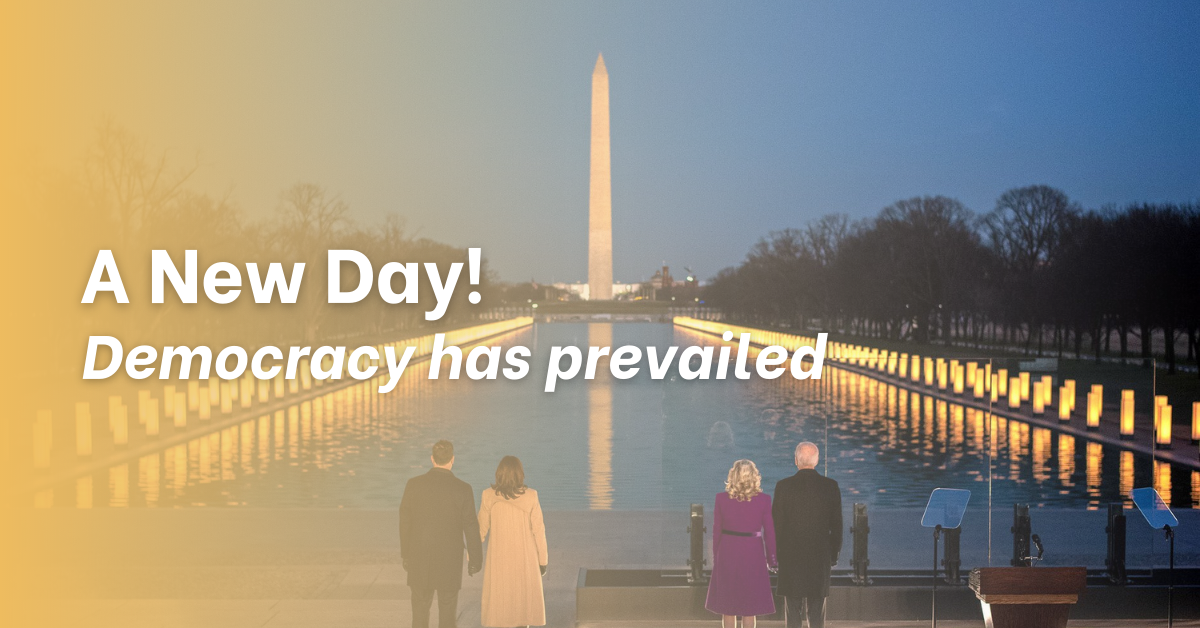
versión en español a continuación
A new day! Yesterday was probably the most monumental Presidential Inauguration in our lifetimes and perhaps ever. With the new leadership of President Biden and Vice President Harris, we can look forward to bold action on the pandemic, climate change, environmental justice, economic recovery, and racial justice. The Biden-Harris Administration has proposed an ambitious agenda that inspires hope for the entire country but speaks especially loudly to communities of color that have been hardest hit by COVID-19 illnesses, death, and its economic impacts, as well as climate pollution and racist actions in policing and immigration.
While the last four years have been extremely difficult for the country and especially for our environmental justice communities, we know that the discriminatory policies that allowed exposure to toxins and subsequently higher disease rates did not start in the last four years. The assaults on our lives, our families, and human rights started long ago and have been upheld by local, state, and federal governments.
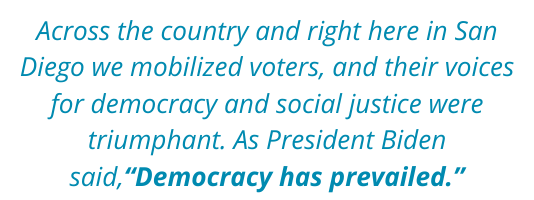
Amplifying the hopeful federal agenda, the slate of newly elected and appointed local officials at the County Board of Supervisors, San Diego and National City Councils, Port Commission and the reformed San Diego Air Pollution Control District Board are all positioned to take action to make real and lasting change. Now, at every level, officials have pledged to make substantial, significant and meaningful change to improve the lives of our communities.
Environmental Health Coalition is ready for this auspicious moment, but it will be a challenge. The neglect and mistreatment have left scars and the division in our country is wide. As President Biden also said, “The divisions in our country, while deep, are not new. The battle is perennial.” We must stand with our communities to demand justice as we have clear evidence, from the insurrection at the Capitol to the razor-thin election results, that the calls for continued discrimination are loud.
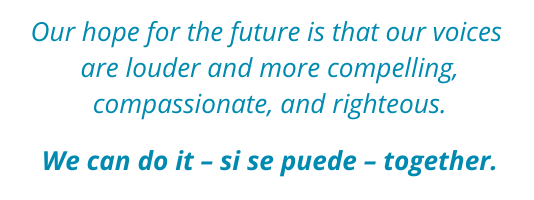
Versión en Español
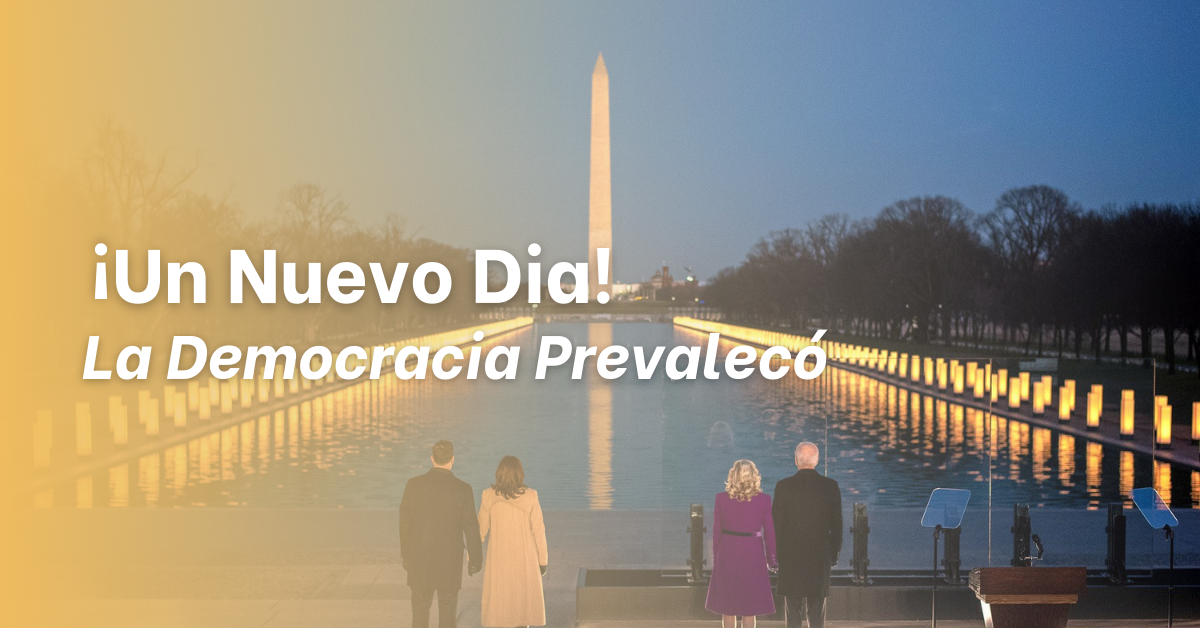
¡Un nuevo día! Ayer vivimos la Inauguración Presidencial posiblemente más monumental en nuestras vidas y tal vez en la historia. Bajo el nuevo liderazgo del Presidente Biden y la Vicepresidenta Harris, anticipamos acciones audaces ante la pandemia, el cambio climático, la justicia ambiental, la recuperación económica y la justicia social. La Administración Biden-Harris propone una ambiciosa agenda de trabajo que inspira esperanza para el país entero, pero que se dirige en una voz particularmente alta a las comunidades de color que han sido las más afectadas por enfermedad, muertes y afectaciones económicas relacionadas con COVID-19, así como con la contaminación ambiental y acciones racistas en la actuación policial y en migración.
A pesar de que los últimos cuatro años han sido extremadamente difíciles para el país y especialmente para nuestras comunidades de justicia ambiental, estamos conscientes de que las políticas discriminatorias que permitieron exposiciones a toxinas y por ende mayores tasas de enfermedades no iniciaron en estos últimos cuatro años. Los atentados contra nuestras vidas, nuestras familias y nuestros derechos humanos comenzaron hace tiempo y los han sostenido gobiernos locales, estatales y federales.
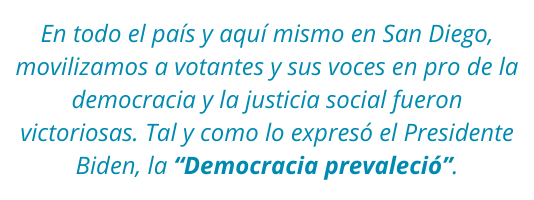
En amplificación de la esperanzadora agenda de trabajo federal, tenemos a toda una serie de funcionarios(as) públicos(as) recientemente electos(as) o designados(as) a la Junta de Supervisores del Condado, los Cabildos de San Diego y National City, la Comisión Portuaria y la reformada Mesa Directiva del Distrito de Control de la Contaminación Atmosférica de San Diego, posicionados(as) para actuar en aras de lograr cambios verdaderos y perdurables. Hoy, en todos los niveles, contamos con funcionarios(as) públicos(as) que se han comprometido a lograr cambios sustantivos, sustanciales y trascendentes que mejoren las vidas de nuestras comunidades.
Environmental Health Coalition está preparada para este auspicioso momento, aunque sabemos que será un reto. El descuido y el maltrato han dejado cicatrices y la división en nuestro país es extensa. Como también indicó el Presidente Biden, “las divisiones en nuestro país, aunque profundas, no son nuevas. La lucha es eterna”. Debemos elevarnos junto con nuestras comunidades para exigir justicia, ya que tenemos clara evidencia – desde la insurrección en el Capitolio hasta los estrechos márgenes de las elecciones – de que el llamado por una continua discriminación sigue fuerte.
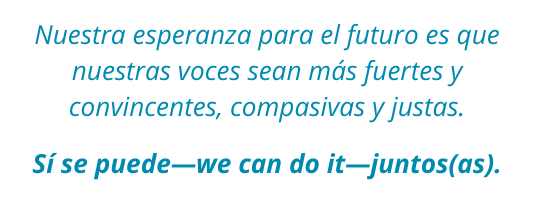
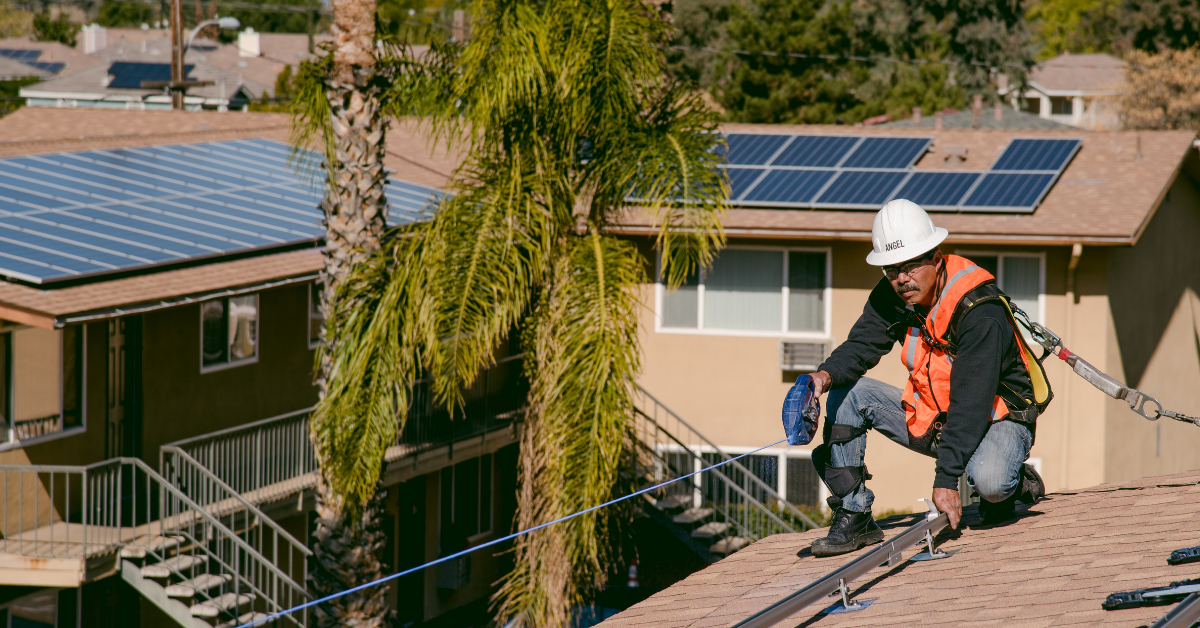
In 2020, Californians dealt with historic wildfires, extreme heat, and power blackouts, all in the midst of a pandemic. California’s most vulnerable communities have endured the greatest harm from the widening racial, socioeconomic, and health inequities of COVID-19 and lack of resilient energy infrastructure.
Ten months into the COVID-19 pandemic, we know that our collective health and safety depends on both in-home resilience and economic support. In-home resilience means, first, that people have access to shelter, and second, that they have access to resources to meet their needs while sheltering in place.
The Solar on Multifamily Affordable Housing (SOMAH) program is an unprecedented investment in clean energy serving low-income and disadvantaged communities, and a key strategy to building in-home resilience for California’s renters. In the absence of statewide rent forgiveness or sustained basic income, solar energy can provide critical financial relief. Additionally, the SOMAH program creates pathways to well-paying, essential jobs in the solar industry by building paid training opportunities into every project.
In its first year, SOMAH has received 158 applications; 29% of these applications are located in disadvantaged communities (or DACs), benefiting those who are most impacted by institutionalized racism and environmental pollution. Once constructed, these SOMAH projects will benefit Californians by:
- Providing savings for nearly 32,000 tenant units
- Sending 90% of the savings directly to renters
- Creating over 700 job training opportunities
Building resilience requires deep collaboration and a community-based approach. EHC advocated for the legislation that created the SOMAH program and has worked to ensure the program provides maximum community benefit since its launch in July 2019. EHC is one of five community-based organizations (CBOs) that work directly with the program administrator to help communicate program benefits to tenants, job seekers and the community we live in.
Our work with the SOMAH program builds off of the deep roots we have in San Diego, National City and the border region’s environmental justice (EJ) communities since 1980. In 2020, we helped build community resilience while overcoming the barriers of the digital divide. We’ve organized and advocated from our homes to help elect bold new leadership, ensure our community members were counted in the census, and continue fighting for the right to live, work, and play free from pollution.
If you rent an apartment, you could save on your electric bills through the SOMAH program. To learn more about how SOMAH can help your landlord convert your building to low-cost solar energy, visit: https://calsomah.org/tenants
Subcategories
Newsletter
June 7 - Congrats to Clean Bay Heroes
May 24 - Solar For All Needs Your Help
May 17 - Stand By Me: This Time in Celebration
